Book contents
- Frontmatter
- Shakespeare and the Media of Film, Radio and Television: A Retrospect
- Shakespeare on the Screen: A Selective Filmography
- Chimes at Midnight from Stage to Screen: The Art of Adaptation
- Orson Welles’s Othello: A Study of Time in Shakespeare’s Tragedy
- Macbeth on Film: Politics
- Representing King Lear on Screen: From Metatheatre to ‘Meta-cinema’
- Verbal-Visual, Verbal-Pictorial or Textual-Televisual? Reflections on the BBC Shakespeare Series
- Two Types of Television Shakespeare
- Shakespeare on Radio
- The Dismemberment of Orpheus: Mythic Elements in Shakespeare’s Romances
- Remembering Hamlet: or, How it Feels to Go Like a Crab Backwards
- ‘Then murder’s out of tune’: The Music and Structure of Othello
- The 'Aeneid' in 'The Tempest'
- The Living Dramatist and Shakespeare: A Study of Shakespeare’s Influence on Wole Soyinka
- Shakespeare at Stratford, Ontario: The John Hirsch years
- Shakespeare Performances in London and Stratford-upon-Avon 1984–5
- The Year's Contributions to Shakespearian Study 1 Critical Studies
- 2 Shakespeare’s Life, Times, and Stage
- 3 Editions and Textual Studies
- Index
The Year's Contributions to Shakespearian Study 1 - Critical Studies
Published online by Cambridge University Press: 28 March 2007
- Frontmatter
- Shakespeare and the Media of Film, Radio and Television: A Retrospect
- Shakespeare on the Screen: A Selective Filmography
- Chimes at Midnight from Stage to Screen: The Art of Adaptation
- Orson Welles’s Othello: A Study of Time in Shakespeare’s Tragedy
- Macbeth on Film: Politics
- Representing King Lear on Screen: From Metatheatre to ‘Meta-cinema’
- Verbal-Visual, Verbal-Pictorial or Textual-Televisual? Reflections on the BBC Shakespeare Series
- Two Types of Television Shakespeare
- Shakespeare on Radio
- The Dismemberment of Orpheus: Mythic Elements in Shakespeare’s Romances
- Remembering Hamlet: or, How it Feels to Go Like a Crab Backwards
- ‘Then murder’s out of tune’: The Music and Structure of Othello
- The 'Aeneid' in 'The Tempest'
- The Living Dramatist and Shakespeare: A Study of Shakespeare’s Influence on Wole Soyinka
- Shakespeare at Stratford, Ontario: The John Hirsch years
- Shakespeare Performances in London and Stratford-upon-Avon 1984–5
- The Year's Contributions to Shakespearian Study 1 Critical Studies
- 2 Shakespeare’s Life, Times, and Stage
- 3 Editions and Textual Studies
- Index
Summary
This year is marked by a new book, Shakespearean Dimensions, from G. Wilson Knight, in his sixtieth (and, sadly, last) year of writing, worthy of welcome. Speaking for himself in a sprightly, brief and candid introduction, Wilson Knight affirms his faith in a Shakespeare saturated in idealism, says that he sees his own natural pursuit to have always been interpretation of Shakespeare, rather than criticism, and recalls a review he wrote of H. A. Mason’s Shakespeare’s Tragedies of Love. Mason had there objected that the almost superhuman status accorded to Antony in Antony and Cleopatra had no dramatic basis in what we see him do, and Wilson Knight demurely observes, ‘Even so, is not the attempt somehow justified by its result? We cannot but admire the temerity with which Mr Mason offers clusters of the most mind-ravishing quotations as a logical part of his indictment.’ Wilson Knight has always had the power to communicate to his readers the mind-ravishing quality of Shakespeare’s dramatic language. The title of his book seems to recall Twelfth Night:
A spirit I am indeed; But am in that dimension grossly clad Which from the womb I did participate,
but the high point for me is the essay on 'Caliban as a Red Man' which, though previously published elsewhere, feels somewhat different in this new context. The book's first chapter invokes the traditional terms 'soul' and 'spirit', since 'there is such a reality, beyond brain and all logical thought' which 'makes a large and determining part of what we mean by man and his universe' (p. 6).
- Type
- Chapter
- Information
- Shakespeare Survey , pp. 207 - 223Publisher: Cambridge University PressPrint publication year: 1987

